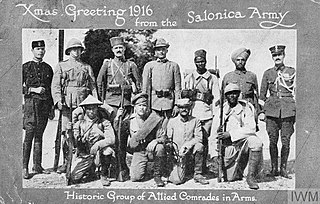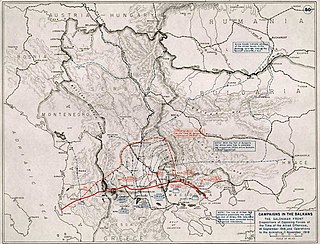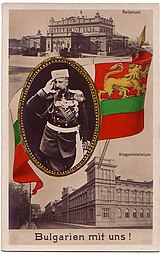Related Research Articles

The Balkan Wars were a series of two conflicts that took place in the Balkan states in 1912 and 1913. In the First Balkan War, the four Balkan states of Greece, Serbia, Montenegro and Bulgaria declared war upon the Ottoman Empire and defeated it, in the process stripping the Ottomans of their European provinces, leaving only Eastern Thrace under the Ottoman Empire's control. In the Second Balkan War, Bulgaria fought against the other four original combatants of the first war. It also faced an attack from Romania from the north. The Ottoman Empire lost the bulk of its territory in Europe. Although not involved as a combatant, Austria-Hungary became relatively weaker as a much enlarged Serbia pushed for union of the South Slavic peoples. The war set the stage for the July crisis of 1914 and thus served as a prelude to the First World War.

The Central Powers, also known as the Central Empires, were one of the two main coalitions that fought in World War I (1914–1918). It consisted of Germany, Austria-Hungary, the Ottoman Empire, and Bulgaria; this was also known as the Quadruple Alliance.

The Triple Alliance was a defensive military alliance between Germany, Austria-Hungary, and Italy. It was formed on 20 May 1882 and renewed periodically until it expired in 1915 during World War I. Germany and Austria-Hungary had been closely allied since 1879. Italy was looking for support against France shortly after it lost North African ambitions to the French. Each member promised mutual support in the event of an attack by any other great power. The treaty provided that Germany and Austria-Hungary were to assist Italy if it was attacked by France without provocation. In turn, Italy would assist Germany if attacked by France. In the event of a war between Austria-Hungary and Russia, Italy promised to remain neutral. The existence and membership of the treaty were well known, but its exact provisions were kept secret until 1919.

The League of the Balkans was a quadruple alliance formed by a series of bilateral treaties concluded in 1912 between the Eastern Orthodox kingdoms of Greece, Bulgaria, Serbia and Montenegro, and directed against the Ottoman Empire, which at the time still controlled much of Southeastern Europe.

The Treaty of London or the Pact of London was a secret agreement concluded on 26 April 1915 by the United Kingdom, France, and Russia on the one part, and Italy on the other, in order to entice the latter to enter World War I on the side of the Triple Entente. The agreement involved promises of Italian territorial expansion against Austria-Hungary, the Ottoman Empire and in Africa where it was promised enlargement of its colonies. The Entente countries hoped to force the Central Powers – particularly Germany and Austria-Hungary – to divert some of their forces away from existing battlefields. The Entente also hoped that Romania and Bulgaria would be encouraged to join them after Italy did the same.
The Bulgarian First Army was a Bulgarian field army during the Balkan Wars, World War I and World War II.

The Entente, or the Allies, were an international military coalition of countries led by France, the United Kingdom, Russia, the United States, Italy, and Japan against the Central Powers of Germany, Austria-Hungary, the Ottoman Empire, and Bulgaria in World War I (1914–1918).

The National Schism, also sometimes called The Great Division, was a series of disagreements between King Constantine I and Prime Minister Eleftherios Venizelos regarding the foreign policy of Greece in the period of 1910–1922 of which the tipping point was whether Greece should enter World War I. Venizelos was in support of the Allies and wanted Greece to join the war on their side, while the pro-German King wanted Greece to remain neutral, which would favor the plans of the Central Powers.

The Balkans theatre or Balkan campaign was a theatre of World War I fought between the Central Powers and the Allies.

The Macedonian front, also known as the Salonica front, was a military theatre of World War I formed as a result of an attempt by the Allied Powers to aid Serbia, in the autumn of 1915, against the combined attack of Germany, Austria-Hungary and Bulgaria. The expedition came too late and with insufficient force to prevent the fall of Serbia and was complicated by the internal political crisis in Greece. Eventually, a stable front was established, running from the Albanian Adriatic coast to the Struma River, pitting a multinational Allied force against the Bulgarian army, which was at various times bolstered with smaller units from the other Central Powers. The Macedonian front remained stable, despite local actions, until the Allied offensive in September 1918 resulted in Bulgaria capitulating and the liberation of Serbia.

The Kingdom of Bulgaria participated in World War I on the side of the Central Powers from 14 October 1915, when the country declared war on Serbia, until 30 September 1918, when the Armistice of Salonica came into effect.

At the outbreak of World War I in August 1914, the Kingdom of Greece remained neutral. Nonetheless, in October 1914, Greek forces once more occupied Northern Epirus, from where they had retreated after the end of the Balkan Wars. The disagreement between King Constantine, who favoured neutrality, and the pro-Allied Prime Minister Eleftherios Venizelos led to the National Schism, the division of the state between two rival governments. Finally, Greece united and joined the Allies in the summer of 1917.
The Bulgarian Second Army was a Bulgarian field army during the Balkan Wars, World War I, and World War II.
In World War I, Albania had been an independent state, having gained independence from the Ottoman Empire on 28 November 1912, during the First Balkan War. It was recognised by the Great Powers as the Principality of Albania, after Turkey officially renounced all its rights in May 1913. Being a fledgling new country, it quickly unravelled and just a few months after taking power, its German ruler, Prince Wilhelm, was forced to flee. After World War I broke out, anarchy took hold of the country as tribes and regions rebelled against central rule. To protect the Greek minority, Greek control was established in the southern districts replacing the Northern Epirote units beginning in October 1914. In response to this, Italy, although officially neutral at the time, also sent troops into the port of Vlorë, while Serbia and Montenegro took control of northern regions. In 1915 Serbia was overrun by combined German, Austro-Hungarian, and Bulgarian forces; the Serbian army retreated across the mountain passes of northern Albania, towards the Adriatic. Italian troops drove the Greeks from southern Albania and brought almost all Albanian territory under their control. Austrian forces invaded in June 1916; Austro-Hungarian forces remained in Albania until the end of the war when a multinational Allied force broke through and pushed them out in 1918.

The mobilization of the Bulgarian Army on the eve of the Kingdom of Bulgaria's entry into World War I took place between 11 and 30 September 1915. It was a direct consequence of the military convention between the German Empire, Austria-Hungary and Bulgaria and the Treaty of Friendship and Alliance between Bulgaria and Germany that were signed on 6 September, marking the official alignment of the country with the Central Powers.

The Battle of Krivolak was a World War I battle, fought between 21 October and 22 November 1915. It was fought in the initial stage of the Macedonian campaign, in the Balkans Theatre. On 21 October, Bulgarian troops attacked the French-held positions near the Strumica rail station, at the time part of the Kingdom of Serbia, starting the battle. Fighting continued until 22 November, when two Serbian divisions failed to capture Skopje, thus rendering the continuation of Entente offensive operations dangerous and forcing the French to evacuate their forces from the region.

The Battle of Kosturino was a World War I battle fought between 6 and 12 December 1915. It was fought in the initial stage of the Macedonian campaign, in the Balkans Theatre. On 6 December, Bulgarian troops attacked the French and British-held trenches in Kosturino, at the time part of the Kingdom of Serbia. Though the early offensive was held in check, on 8 December, Bulgaria managed to infiltrate the Memesli ravine. Bulgaria then seized Crete Simonet, thus threatening to outflank the Allies. The Entente defeat at Kosturino led to the complete withdrawal of Allied forces from Serbia, thus enabling the Central Powers to build the Berlin to Constantinople rail line. In the meantime, the Allies concentrated on solidifying their defenses in Greece.

The Liberation of Serbia, Albania and Montenegro was a military action in the Balkans in the final weeks of World War I. Between 29 September and 11 November 1918, the Allied Army of the Orient liberated these three countries from occupation by the Central Powers.
Sliven was a prisoner-of-war camp established in Sliven in 1915 with the intent of housing Serbian troops captured during the course of World War I. Over time Greek and Serbian civilians joined their ranks reaching 19,000 at its peak. From 1916 until its dissolution in 1918, the camp served as a punitive institution. Internees suffered from the lack of proper housing conditions, typhus, malnutrition and ill treatment from their guards. This led to the deaths of over 6,000 prisoners.

Boško I. Čolak-Antić, also known as Boshko Tcholak-Antitch, was a Serbian diplomat, and Marshal of the Court of the Kingdom of Serbia and Kingdom of Yugoslavia, He served as ambassador in the Middle East as well as in several European capitals. From a prominent noble military family, he was a skilled diplomat who played a significant role during the critical era of the First World War.
References
This article includes a list of references, related reading, or external links, but its sources remain unclear because it lacks inline citations .(November 2015) |
- Илчев, И., България и Антантата през Първата световна война.
- Porter, Ch. The Career of Theophile Delcasse. Wesport, Connecticut, 1975.
- Churchill W.S. The World Crisis. New York. Charles Scribner Sons, 1949.
- Стателова, Ел., История на България.
- Влаховм Т., Отношения между България и Централните сили по време на войните 1912–1918г.
- Райчевски, Ст., Българите в световните хроники 1912–1919.

